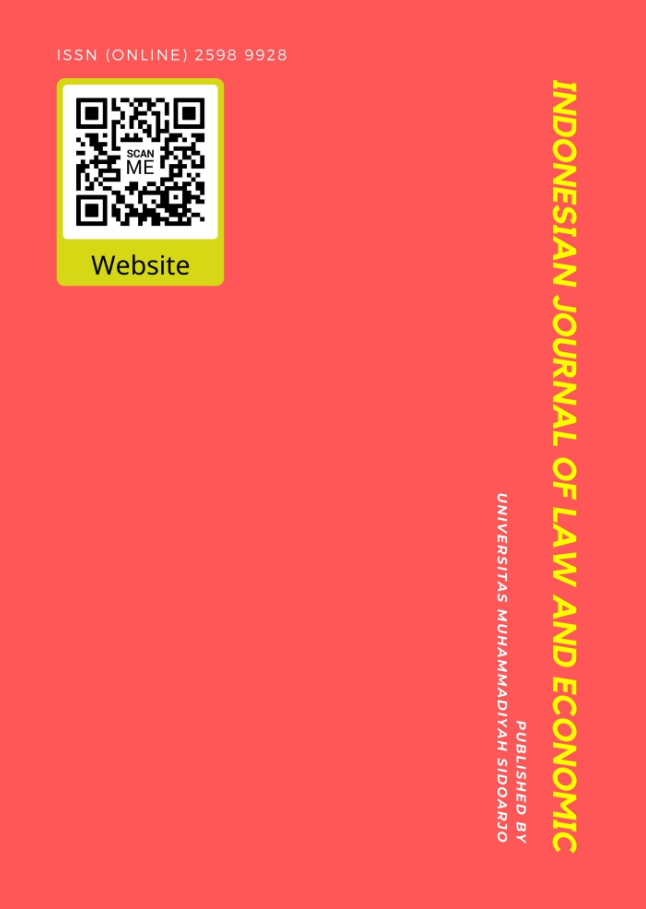Privacy Violations in Live Streaming Pose Significant Legal Challenges Globally
Pelanggaran Privasi dalam Siaran Langsung Menimbulkan Tantangan Hukum yang Signifikan Secara Global
Abstract
General Background: The rise of social media has significantly transformed the landscape of personal fame and income generation, particularly with the advent of live streaming. Specific Background: However, this phenomenon has led to ethical concerns regarding privacy violations, where individuals are recorded without consent, potentially resulting in reputational harm. Privacy is a fundamental right, and its violation undermines the principles of human dignity and autonomy. Knowledge Gap: While existing literature discusses the implications of privacy in digital spaces, there is a limited exploration of legal frameworks that govern these practices, particularly in relation to live streaming platforms. Aims: This research employs a normative legal analysis, focusing on Indonesian regulations, to examine the legality of privacy violations in live streaming contexts and to assess the accountability of content creators and platforms. Results: The analysis reveals that current legislation, particularly Article 26 of Law Number 11 of 2008 on Electronic Information and Transactions, mandates consent for the use of personal data. Violators can face legal repercussions, including imprisonment and fines, under Article 45 of the same law. Novelty: This study contributes to the discourse on digital privacy by linking legal obligations to ethical practices in social media, emphasizing the need for awareness among content creators. Implications: The findings underscore the necessity for stringent adherence to privacy laws in live streaming to protect individual rights, suggesting that both users and platforms must uphold ethical standards to foster a safe online environment, thereby reinforcing the protection of human rights in the digital age.
Highlights:
- Social Media: Boosts fame and income through live streaming.
- Consent Required: Personal data use demands owner’s permission by law.
- Privacy Matters: Content creators must respect individual privacy rights.
Keywords: Privacy Violations, Live Streaming, Social Media, Legal Framework, Consent
Downloads
Metrics
References
F. Liexzel, J. E. Luik, and F. Goenawan, “Strategi Komunikasi Persuasi Oleh Live Streamers Indonesia Dalam Aplikasi MICO,” Jurnal e-Komunikasi, vol. 11, no. 1, Art. no. 1, 2023, Accessed: Aug. 12, 2024. [Online]. Available: https://publication.petra.ac.id/index.php/ilmu-komunikasi/article/view/13835
D. N. Andari, H. Robbani, and A. Alianny, “Overview of Tiktok Live Streaming Host Talent Engagement and Earning Commissions,” FOCUS, vol. 4, no. 1, Art. no. 1, Feb. 2023, doi: 10.37010/fcs.v4i1.1247.
S. D. Rosadi and G. G. Pratama, “Urgensi Perlindungan Data Privasi Dalam Era Ekonomi Digital Di Indonesia,” Veritas et Justitia, vol. 4, no. 1, Art. no. 1, Jun. 2018, doi: 10.25123/vej.v4i1.2916.
S. A. Kusnadi and A. U. wijaya, “Perlindungan Hukum Data Pribadi Sebagai Hak Privasi,” AL WASATH Jurnal Ilmu Hukum, vol. 2, no. 1, Art. no. 1, 2021.
A. F. Westin, Privacy and Freedom. Ig Publishing, 2015.
S. Anissa and M. T. Multazam, “Assessing Legal Measures for Addressing Personal Data Misuse in Commercial Settings: A Critical Analysis,” Indonesian Journal of Law and Economics Review, vol. 19, no. 2, pp. 10–21070, 2024.
M. T. Multazam and A. E. Widiarto, “Digitalization of the Legal System: Opportunities and Challenges for Indonesia,” Rechtsidee, vol. 11, no. 2, pp. 10–21070, 2023.
E. Rosnawati, M. T. Multazam, and N. F. Mediawati, “Personal Data Collection: Recent Developments in Indonesia,” KnE Social Sciences, pp. 52–63, 2022.
R. Indonesia, Undang-Undang Nomor 11 Tahun 2008 Tentang Informasi Dan Transaksi Elektronik. 2008. Accessed: Aug. 12, 2024. [Online]. Available: http://peraturan.bpk.go.id/Details/37589/uu-no-11-tahun-2008
L. Sautunnida, “Urgensi Undang-Undang Perlindungan Data Pribadi di Indonesia: Studi Perbandingan Hukum Inggris dan Malaysia | Sautunnida | Kanun Jurnal Ilmu Hukum,” vol. 20, Jun. 2018, doi: https://doi.org/10.24815/kanun.v20i2.11159.
S. Yuniarti, “Perlindungan hukum data pribadi di Indonesia,” Business Economic, Communication, and Social Sciences Journal (BECOSS), vol. 1, no. 1, pp. 147–154, 2019.
U. Mutiara and R. Maulana, “Perlindungan Data Pribadi Sebagai Bagian Dari Hak Asasi Manusia Atas Perlindungan Diri Pribadi,” Indonesian Journal of Law and Policy Studies, vol. 1, no. 1, pp. 42–54, 2020.
R. Indonesia, Undang-Undang Nomor 1 Tahun 2024 Tentang Perubahan Kedua atas Undang-Undang Nomor 11 Tahun 2008 tentang Informasi dan Transaksi Elektronik. 2024. Accessed: Aug. 12, 2024. [Online]. Available: http://peraturan.bpk.go.id/Details/274494/uu-no-1-tahun-2024
D. H. Kurniawati and M. T. Multazam, “Legal Implications of Personal Data Misuse in Emergency Contact Information for Online Loan Services:,” Indonesian Journal of Law and Economics Review, vol. 19, no. 2, Art. no. 2, May 2024, doi: 10.21070/ijler.v19i2.1007.
R. Indonesia, Undang-Undang Nomor 27 Tahun 2022 Tentang Pelindungan Data Pribadi. 2022. Accessed: Aug. 13, 2024. [Online]. Available: http://peraturan.bpk.go.id/Details/229798/uu-no-27-tahun-2022
H. Niffari, “Perlindungan Data Pribadi Sebagai Bagian Dari Hak Asasi Manusia Atas Perlindungan Diri Pribadi (Suatu Tinjauan Komparatif Dengan Peraturan Perundang-Undangan Di Negara Lain),” Jurnal Yuridis, vol. 7, no. 1, pp. 105–119, 2020.
F. Priscyllia, “Perlindungan Privasi Data Pribadi Perspektif Perbandingan Hukum,” Jatiswara, vol. 34, no. 3, pp. 239–249, 2019.
R. Indonesia, Undang-Undang Nomor 39 Tahun 1999 Tentang Hak Asasi Manusia. 1999. Accessed: Aug. 13, 2024. [Online]. Available: http://peraturan.bpk.go.id/Details/45361/uu-no-39-tahun-1999
Copyright (c) 2024 Nur Intan Purwani Jaya, Mochammad Tanzil Multazam

This work is licensed under a Creative Commons Attribution 4.0 International License.










